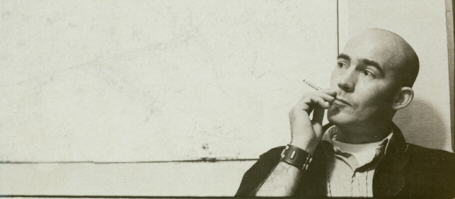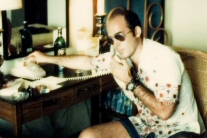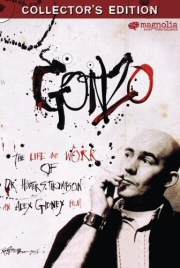 With the temperature dropping, it's time to find someone to keep you warm. Find your hookups with our online dating guide!
With the temperature dropping, it's time to find someone to keep you warm. Find your hookups with our online dating guide!
- Rated R
- Documentary
- 2008
- DVD
All photos © Magnolia Pictures
Reviewed by Bob Westal
()
he outpouring over the recent death of Tim Russert notwithstanding, it’s still fair to say that, whatever our politics, most of us see a lot of cowards in American journalism, and perhaps a few outright villains, but few heroes of any sort. For all his drinking and drug-taking on an unprecedented scale, fits of verbal and alleged physical violence, outsized love of firearms, and massively inconsistent late career, Hunter Thompson embodied the alternative journalism championed by his main employer Rolling Stone, and, by inventing his own form of manic, honestly self-absorbed “gonzo” journalism, is both hero and antihero to heretics and subversives of all stripes.
Best known for “Fear and Loathing in Las Vegas,” his hilarious, semi-fictionalized literary fever dream on the decline of sixties idealism and the eternal reality of American greed and venality, Thompson was also as close to a rock star as any political journalist has ever been – even if he had to compete for fame against Gary Trudeau’s cartoon rendering of him as Doonesbury’s multi-drug-addicted, gun toting Uncle Duke, which he apparently hated. He was evidently much more fond of being portrayed in movies, however, and befriended both Bill Murray, who played him in 1980’s wildly unsuccessful “Where the Buffalo Roam” and later Johnny Depp, whose brilliant, on-the-nose portrayal of Thompson made Terry Gilliam’s 1998 film version of “Fear and Loathing” into an eventual cult success.
Featuring narration culled from Thompson’s work and read, both on- and off-screen, by Depp, acclaimed documentarian Alex Gibney’s follow-up to his Oscar-winning torture exposé, “Taxi to the Dark Side,” makes no attempt to tell a complete story of Thompson’s life. Instead, after a searing opening featuring Thompson’s amazingly accurate commentary in the wake of the terrorist attacks of 9/11, Gibney concentrates on the reminiscences of family members like Thompson’s first wife and lifelong friend Sondi Wright, affectionate coworkers like his long-time editor Jan Wenner, and his astutely surreal illustrator Ralph Steadman, as well as a number of celebrity friends, including such unlikely admirers as pious right-winger Pat Buchanan and truly devout ex-President Jimmy Carter.

Overall, Gibney’s film has the most fun as it focuses on the stories behind Thompson’s early successes, including a clever recreation of moments from the actual “Fear and Loathing” road trip to Las Vegas with Mexican-American lawyer Oscar Zeta Acosta (the Samoan “Dr. Gonzo” in the book) using actual audiotape from the trip recorded by Thompson. Modern day political junkies will definitely find much to reflect on with the film’s depiction of Thompson’s involvement in the doomed George McGovern presidential campaign of 1972, while writing what became “Fear and Loathing on the Campaign Trail,” as well as his later championing of President-to-be Carter, and his possibly fatal depression following the defeat of John Kerrey in 2004. True, Thompson’s 2005 suicide at age 67 had been literally decades in the planning, but an end to the administration of George W. Bush might well have given the aging professional druggie more of a reason to hang on for his allotted three score and ten. He would have loved the 2008 primary.
Though relying a great deal on footage from the two Thompson-based movies as well as some documentaries in which the real Hunter Thompson appeared, Gibney’s video documentary flies solidly for nearly as long as Thompson does. Then, following a disastrous trip to Zaire to cover the Ali vs. Frasier “rumble in the jungle,” the film seems to fall prey to lethargy, just as Thompson’s career and writing prowess takes a sudden downward plunge. The last 30 minutes covering Thompson’s final decades as a man who has seemingly outlived his ability to write (or, perhaps, his ability to write under the influence of innumerable substances, and his own probably bipolar nature) seems to creep along repetitively. With a two-hour running time, a bit less theorizing on Thompson’s influence and perhaps bit more biographical information about the writer’s tragicomic personal life might have worked better, though perhaps some old wounds are best left unopened.
Still, “Gonzo” is definitely worth your time. There’s no underestimating Thompson’s importance in American cultural and political life, and his influence lingers – he freed up writers of opinionated reportage (some think he all but invented the blog), and muckraking personality documentarians like Michael Moore and Nick Broomfield owe their careers to the personal style of engagement that Thompson pioneered. Even if it feels about 30 minutes too long, Alex Gibney’s appropriately fanciful and sometimes beautiful documentary is a kicky look at the real man behind the lunacy. It’s excessively loose and far from definitive – but the last thing Thompson would have wanted was the Ken Burns treatment.
 |
 |
You can follow us on Twitter and Facebook for content updates. Also, sign up for our email list for weekly updates and check us out on Google+ as well.











